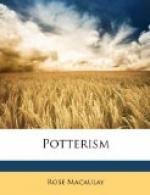And the twins were neither, but more like the less agreeable type of reviewer, when they deigned to read or comment on their mother’s books at all, which was not always. Johnny’s attitude towards his mother suggested that he might say politely, if she mentioned her books, ’Oh, do you write? Why?’ Mrs. Potter was rather sadly aware that she made no appeal to the twins. But then, as Clare reminded her, the twins, since they had gone to Oxford, never admitted that they cared for any books that normal people cared for. They were like that; conceited and contrary.
To change the subject (so many subjects are the better for being changed, as all those who know family life will agree) Jane said, ’Johnny and I are going on a reading-party next month.’
‘A little late in the day, isn’t it?’ commented Frank, the only one who knew Oxford habits. ‘Unless it’s to look up all the howlers you’ve made.’
‘Well,’ Jane admitted, ’it won’t be so much reading really as observing. It’s a party of investigation, as a matter of fact.’
‘What do you investigate? Beetles, or social conditions?’
’People. Their tastes, habits, outlook, and mental diseases. What they want, and why they want it, and what the cure is. We belong to a society for inquiring into such things.’
‘You would,’ said Clare, who always rose when the twins meant her to.
‘Aren’t they cautions,’ said Mrs. Frank, more good-humouredly.
Mrs. Potter said, ’That’s a very interesting idea. I think I must join this society. It would help me in my work. What is it called, children?’
‘Oh,’ said Jane, and had the grace to look ashamed, ’it really hardly exists yet.’
But as she said it she met the sharp and shrewd eyes of Mr. Potter, and knew that he knew she was referring to the Anti-Potter League.
5
Mr. Potter would not, indeed, have been worthy of his reputation had he not been aware, from its inception, of the existence of this League. Journalists have to be aware of such things. He in no way resented the League; he brushed it aside as of no account. And, indeed, it was not aimed at him personally, nor at his wife personally, but at the great mass of thought—or of incoherent, muddled emotion that passed for thought—which the Anti-Potters had agreed, for brevity’s sake, to call ‘Potterism.’ Potterism had very certainly not been created by the Potters, and was indeed no better represented by the goods with which they supplied the market than by those of many others; but it was a handy name, and it had taken the public fancy that here you had two Potters linked together, two souls nobly yoked, one supplying Potterism in fictional, the other in newspaper, form. So the name caught, about the year 1912.




